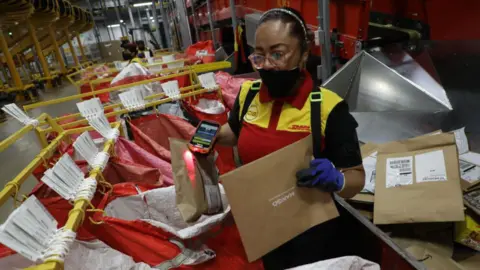### DHL Lifts Suspension of High-Value Deliveries to the U.S.
In a significant turnaround, DHL has announced the lifting of its recent suspension on high-value deliveries exceeding $800 to the United States. This decision comes after successful negotiations that have resulted in smart adjustments to customs regulations. The suspension had been enacted earlier this month due to an overwhelming surge in bureaucratic requirements linked to new tariff regulations implemented under President Donald Trump’s administration.
During this suspension, DHL had paused shipments of high-value goods to American consumers until further notice. The company highlighted a substantial increase in “red tape” as a driving factor for this action, which posed serious challenges for logistics and delivery services.
### Constructive Dialogue with U.S. Authorities
According to a spokesperson for DHL, the organization values the positive momentum gained through “constructive dialogue” between representatives from the delivery industry and various U.S. government entities. The discussions aimed to streamline and optimize customs processes to ensure that essential goods could still reach consumers without unnecessary delays or complications.
“That constructive dialogue allowed us to formulate the necessary changes that will benefit both our services and our customers,” the DHL spokesperson stated. “We are pleased to resume our service of business-to-consumer shipments valued over $800 into the U.S.”
### Impact of Adjusted Customs Regulations
The U.S. Customs and Border Protection, under the Department of Homeland Security and the Department of Commerce, has been involved in discussions surrounding the changes in customs policies. The DHL announcement represents a broader pattern of tension between businesses and the White House regarding tariff implementation and its effects on international shipping.
Previously, packages with a value of up to $2,500 were allowed to enter the U.S. with minimal documentation. However, the implementation of stricter protocols in line with tariffs introduced earlier this month has now lowered this threshold, increasing the average paperwork required for such shipments.
DHL had pointed out that this tightening of regulations led to a substantial spike in formal customs clearances, which required around-the-clock attention from DHL’s logistics teams. While the company is working diligently to manage these increases, shipments valued over $800 may still face delays of several days due to ongoing adjustments.
### The “De Minimis” Rule Controversy
As part of the broader discussions about tariffs, headlines have also been drawn to the upcoming repeal of the “de minimis” rule that currently allows low-value packages entering the U.S. to avoid tariffs. As of May 2, this loophole will no longer exist, meaning that packages valued at less than $800, particularly those arriving from China and Hong Kong, may soon incur additional charges.
This adjustment particularly impacts companies like Shein and Temu, which have both expressed concerns that these new regulations will necessitate an increase in prices for American consumers. “Due to recent changes in global trade rules and tariffs, we will, unfortunately, have to adjust our pricing,” a spokesperson for Temu noted.
### Conclusion and Future Directions
The back and forth between logistics firms like DHL and U.S. governmental agencies underscores the complexity involved in maintaining efficient trade relationships and the balancing act of regulating tariffs. With DHL’s reinstatement of high-value shipments, it appears that there is potential for cooperation that not only serves businesses but also enhances consumer access to goods.
Continued dialogue and adjustments to policy will be essential for smooth trade operations as the landscape evolves. The outcome of these negotiations may set crucial precedents for future shipping regulations and trade practices between the United States and international delivery services.



